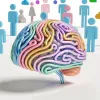"Emotional Intelligence: Why It Can Matter More Than IQ" by Daniel Goleman is a pivotal work that explores the concept of emotional intelligence (EI) as a critical factor in personal success and well-being. Goleman argues that EI—comprising skills such as self-awareness, self-regulation, motivation, empathy, and social skill—can be as important, if not more so, than the traditional measure of cognitive intelligence, IQ. Through compelling research and anecdotes, Goleman demonstrates how emotional intelligence impacts various aspects of life, including work, relationships, and health.
Analysis
Redefining Intelligence
Goleman challenges the traditional metrics of intelligence, which prioritize cognitive aspects such as memory and problem-solving. He argues that EQ is a more potent predictor of success, happiness, and well-being. At the heart of his argument is the premise that the ability to manage one’s emotions, and understand the emotions of others, is critical in navigating the complexities of life.
The Components of Emotional Intelligence
Goleman breaks down emotional intelligence into five key components:
- Self-awareness: Recognizing one’s own emotions and their effects.
- Self-regulation: Managing one's internal states, impulses, and resources.
- Internal Motivation: Directing emotions towards achieving goals.
- Empathy: Recognizing emotions in others.
- Social Skills: Managing relationships to move people in desired directions (whether in leadership, teamwork, or conflict resolution).
Emotional Intelligence in Personal Development
Goleman extensively discusses how developing emotional intelligence can lead to greater personal achievement and satisfaction. He emphasizes that emotional competencies are not innate talents, but rather learned capabilities that must be worked on and can be developed to achieve outstanding performance. Goleman suggests that emotional intelligence increases with age and experience, which provides a hopeful outlook for lifelong personal growth.
Impact on Leadership and Organizations
A substantial part of Goleman's analysis is dedicated to the implications of emotional intelligence in the workplace. Leaders with high emotional intelligence are shown to create more positive environments, foster better teamwork, and effectively manage both stress and conflict. Goleman argues that emotional intelligence is the sine qua non of leadership. Without it, a person can have the best training in the world, an incisive, analytical mind, and an endless supply of smart ideas, but he still won't make a great leader.
Scientific Underpinnings and Criticisms
Goleman does not merely propose a theory but supports his arguments with neuroscience, explaining how the brain processes emotions and the biological basis for how emotional responses are triggered. However, it's important to note that some critics argue that emotional intelligence is a difficult construct to measure and fear its reduction into a simplistic metric, similar to IQ.
Social and Cultural Impact
The book also touches upon the broader social implications of emotional intelligence, suggesting that enhancing collective emotional intelligence could lead to better conflict resolution on a global scale and more compassionate societies. Goleman’s vision extends into education systems, advocating for the incorporation of emotional intelligence curricula to better prepare students for life beyond school.
In conclusion, Daniel Goleman's "Emotional Intelligence: Why It Can Matter More Than IQ" offers a persuasive, thought-provoking, and potentially transformative view on what it means to be ‘intelligent’. The book not only shifts the paradigm on how we understand mental faculties but also provides a compelling argument for the cultivation of emotional skills as a foundational aspect of human development and leadership.
Key Takeaways and Insights
🌟 Develop Self-Awareness: Recognize and understand your moods and emotions, and how they affect others.
🌱 Manage Emotions: Learn techniques to manage anger and frustration in a healthy way.
🔄 Self-Regulation: Cultivate the ability to delay gratification and regulate one's emotions to handle uncertainties and adapt to changes.
🤝 Empathy: Enhance the ability to identify with and understand the wants, needs, and viewpoints of those around you.
👥 Social Skills: Improve skills such as active listening, verbal communication, non-verbal communication, and conflict management.
💪 Motivation: Foster intrinsic motivation to pursue goals with energy and persistence.
🌐 Cultivate Relationships: Build strong relationships both in personal life and at work by being emotionally intelligent.
🛡️ Stress Management: Use emotional intelligence to control stress levels and keep emotions in check during difficult situations.
🔄 Feedback Reception: Develop the ability to receive, analyze, and learn from constructive criticism.
🎯 Leadership Skills: Utilize emotional intelligence to inspire, guide, and motivate others effectively.
Audience
This book is ideal for anyone looking to enhance their personal and professional relationships and succeed in leadership roles. It benefits educators, mental health professionals, managers, and corporate leaders who wish to understand and apply the principles of emotional intelligence in their fields.
Alternative Books
- "Social Intelligence: The New Science of Human Relationships" by Daniel Goleman
- "Primal Leadership: Learning to Lead with Emotional Intelligence" by Daniel Goleman, Richard Boyatzis, and Annie McKee
- "How to Win Friends and Influence People" by Dale Carnegie
- "The 7 Habits of Highly Effective People" by Stephen R. Covey
- "Mindset: The New Psychology of Success" by Carol S. Dweck


